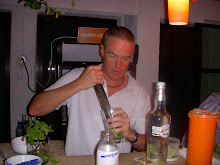Calvin Trillin asks this question in his Sept. 3/10 New Yorker article about street vendors in Singapore, and it's also a key theme in any number of television food shows, most notably Rick Bayless' "Mexico: One Plate at a Time" on PBS and "Anthony Bourdain: No Reservations," a Travel Channel staple.
Bayless regularly opens his show in a market, noshing on authentic food dished up by Mexican vendors. Sure, he also hits up some trendy restaurants serving not-so-traditional cuisine, but he usually shows how the traditional street food influences even the most progressive chefs.
Bourdain, in this week's episode from Argentina, stepped into one of Buenos Aires' infamous villas miserias to sample a stew made from hog parts, chorizo, squash and beans. Bourdain (though obviously accompanied by his crew and a native Argentinian) was in his element, eating simple food prepared in a streetside cazuela, just as he has in numerous cities around the world.
The one constant in foreign street food tends to be the inclusion of "lesser" cuts of meat, which Bourdain and Travel Channel chum Andrew Zimmern coaxed from a New York restaurateur preparing organ meats for his clientele.
"The rest of the world doesn't eat filet mignon," he told his celebrity guests. The history of the world's nutrition, he argued, owes much more to livers, chitlins and brains than it does to juicy choice cuts.
Trillin on Americans' ideas about street food:
"For an American visitor the operational translation for signs that ostensibly say something like 'bhel puri' or 'tacos de nopales' is 'Delivery System for Unfamiliar Bugs That You Will Bitterly Regret Having Ingested.' "
He continues to describe Singapore's efforts from the 1970s to enforce higher public health standards on its street vendors. That effort resulted in all vendors being brought to central markets with proper health controls.
Fort Collins' most famous street vendor, the gyro guy who sets up in Old Town and feeds the barflies there, is a start, but he can hardly replace the kinds of experiences that Trillin, Bayless, Bourdain and Zimmern encourage us to try.
Wednesday, September 12, 2007
Subscribe to:
Post Comments (Atom)

No comments:
Post a Comment